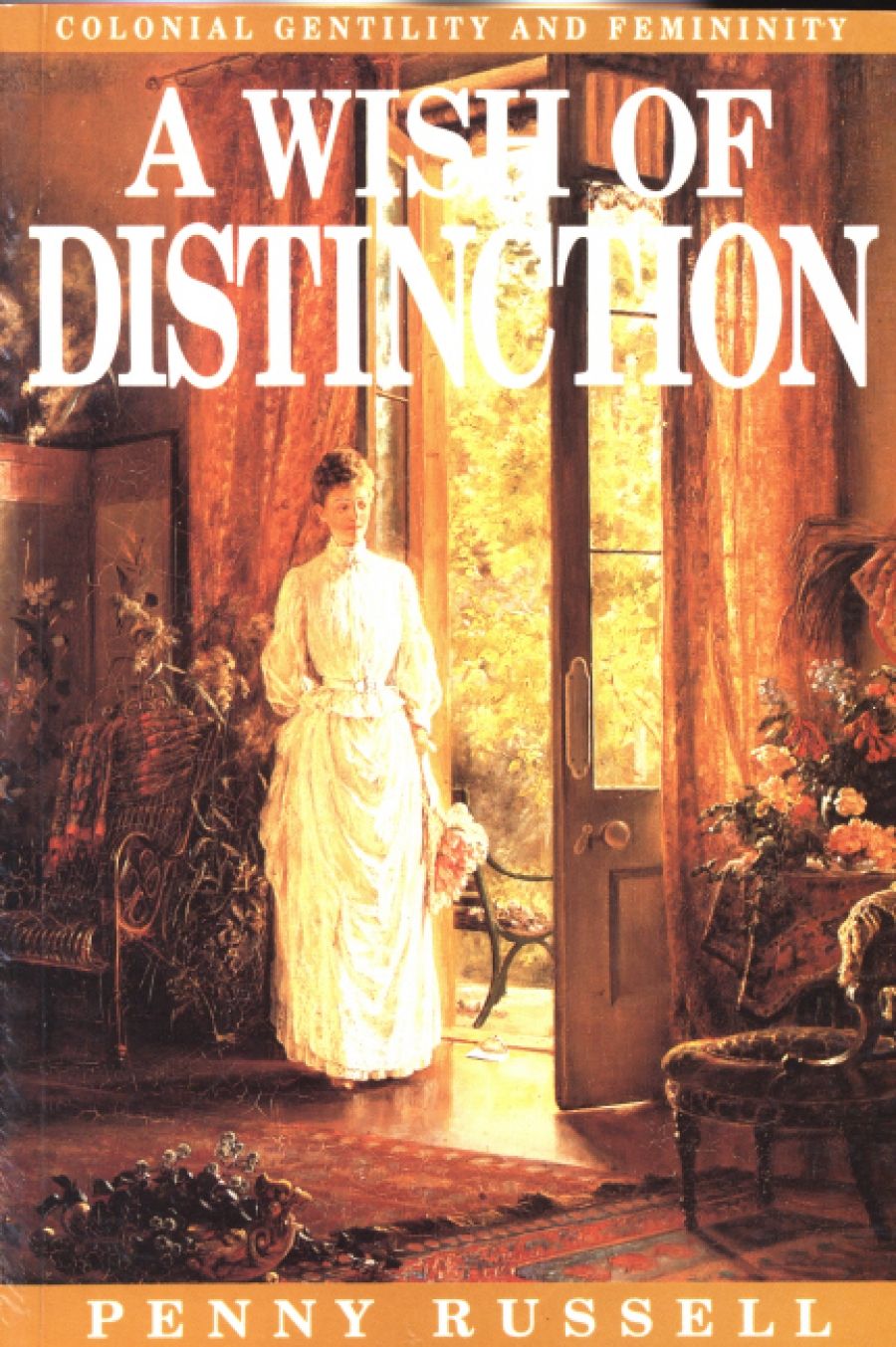
- Free Article: No
- Contents Category: Society
- Review Article: Yes
- Online Only: No
- Custom Highlight Text:
Penny Russell could not have chanced upon a better phrase than Jane Austen’s ‘It was rather a wish of distinction … It was the desire of appearing superior to other people’ when she was seeking a title for this book. The colonial gentility of Melbourne, or ‘Society’ if you want to use their understanding of who they were, could only define themselves in terms of who they were not – or who they would never wish to be.
- Book 1 Title: A Wish of Distinction
- Book 1 Subtitle: Colonial gentility and femininity
- Book 1 Biblio: MUP, S24.95 pb
A Wish of Distinction: Colonial gentility and femininity is really a detailed study of the manners and mores of the genteel, ‘the best people’ of Melbourne between 1840 and 1880. The nuances of manners and mores, of course, were the only weapons the so-called civilised could use to keep themselves exclusive. Russell concentrates mainly on the women but the men are sketched, too, mainly by reflection from the women.
Russell’s main sources are quite comprehensive diaries kept by women such as Thomas Anne Ward Cole, who all her life observed minutest details relating to respectability and ‘superiority’, and Annie Dawbin, whose fascinating and full diaries have been edited by Lucy Frost. Annie had a naturally passionate nature and lively intelligence that kept leading her to the edge of both respectability and superiority. Her diaries have an extra zip.
Russell’s intention is to concentrate on the way ‘an endlessly reworked notion of “gentility” continued to be dominant in nineteenth-century Melbourne society’. She suggests that her project is ‘consistent with a feminist exploration of the history of social power and elitism in the colonies’:
Investigating the concept of gentility itself focuses attention on the experience of women. It was women, far more than men, who ensured the survival of gentility as a crucial ideological formulation, and whose life experiences were most materially affected by it. Genteel femininity both constrained women and represented the principal means by which some at least could claim status and authority in Melbourne society.
What emerges from Russell’s selection of detail is more the idea of constraint than power. In the case of unmarried women, the constraints are most obvious and cruel. George Rusden, a virtuous man in every way, tried hard to do what was best for his two unmarried sisters. But when one threw herself obsessively into piano practice in her late forties, Rusden was appalled at the unseemliness of it. It was all right to play for the family’s amusement, but music as a balm for the deepest regions of your own soul was not to be countenanced. Rusden threatened to sell the piano and Grace fled to New South Wales. The story of Grace Rusden is one of the most pitiful in Russell’s book, but I imagine it had many parallels.
Women such as Thomas Anne Ward Cole adopted the rigorous codes of gentility so that they could retain their position. Some of her younger family members laughed at what they called her ‘company manners’, but Mrs Cole seems to have glided serenely through life dependent upon just such manners. Real friendship was not sought – the habit of ‘calling’ for the gentry was of more importance than intimacy and support. Annie Dawbin’s diary makes it clear that in the female world rivalry rather than support was what was offered and what was expected.
The two best chapters in this book are those with the best titles: ‘The Genteel Performance’ and ‘Anatomy of a Lady’. The first has some wonderful insights into the psychology of the performance of the gentry, but the second is even more rewarding. It looks at the bodily functions of a ‘lady’ and what one could and could not talk about. Illness was fine to discuss, as was death. Women took charge in these instances, although after the death they were expected to assume the illness of 'Grief' in all its prescribed forms. Because of their familiarity with illness and because their nursing abilities were valued and appreciated, women felt at ease to be matter-of-fact with various bodily functions that would not, perhaps, be discussed so freely today. They seemed to be prone particularly to diarrhoea in the colonies – although, Russell says, they never really learned to spell it.
Russell’s book was originally a doctoral thesis and it still has all the hallmarks. There is no serious attempt to make the style really engaging and there are far too many heavily detailed references in the opening chapter. Ultimately, Russell’s thesis seems unfocussed and tends to peter out. As a study of class, it is full of wonderful information, but, as an overview, it does not have the narrative interest that, for example, Janet McCalman’s Journeyings has. The book does not hang together but falls into separate pieces and this diminishes the clarity of the whole.


Comments powered by CComment